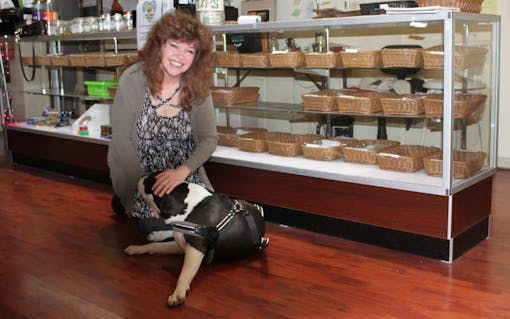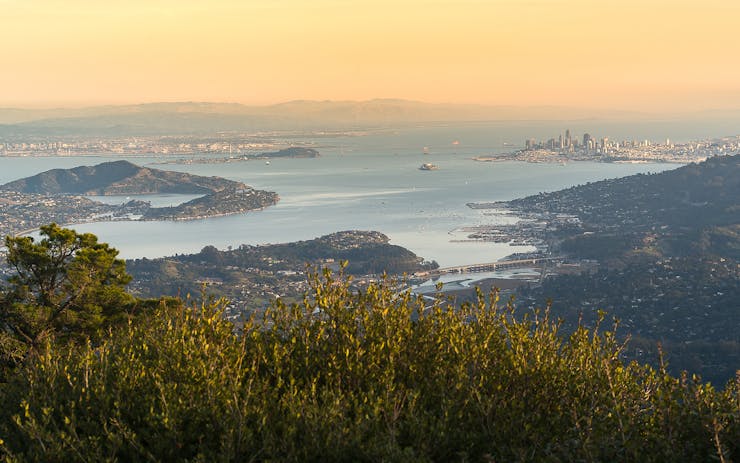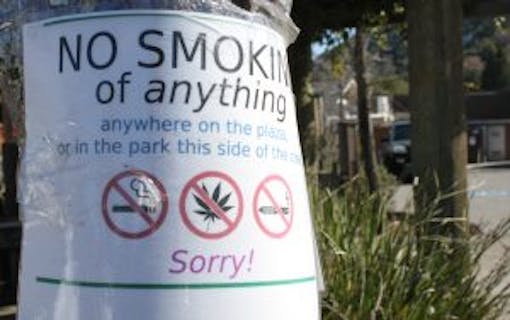In 1996, a few months before California voters passed Proposition 215, America’s first medical cannabis law, a blues singer named Lynnette Shaw opened the Marin Alliance for Medical Marijuana dispensary. “It was not legal, not even a little bit,” Shaw acknowledges today. Even so, the place just seemed so quintessentially Marin County. Her cannabis shop opened beneath verdant hills, situated next to a yoga wellness studio and a hot tub, sauna, and sundeck in Fairfax, a tiny town with an Art Deco movie theater and decidedly progressive politics.
Once home to the Grateful Dead, the cannabis-loving liberal haven now maintains some of California’s strictest prohibitions against cannabis businesses.
Marin County, located just across the Golden Gate Bridge from San Francisco, was the home of the Grateful Dead and cannabis-fragrant, clothing-optional music fests in the 1960s. Three decades later, 73 percent of local voters supported Proposition 215. After its passage, the five Green Party members on the Fairfax Town Council in 1997 heartily approved a business license for the Marin Alliance.
And yet today, after another lopsided pro-cannabis vote in Marin, the Marin Alliance remains the only licensed marijuana store in the county of 260,000 residents.
Perhaps more surprisingly, the liberal haven maintains some of California’s strictest prohibitions against cannabis businesses, which are completely banned in a number of towns and in the unincorporated areas of Marin County.
It seems that Marin, with its picturesque woodlands and marinas, liberal politics and tony boutiques, is far less cannabis-friendly than its voting record suggests.

Lynnette Shaw opened Marin County’s first dispensary in 1996, and fought the federal government to keep it open. It’s still one of the only cannabis storefronts in Marin. (Photo: Peter Hecht for Leafly)
No Van Sleeping, No Cannabis Stores
Perhaps the first cue was years ago when, after pilgrimages of hippies trekked to Marin to witness the Dead live on stage, the county made it a crime to sleep in a van.
'This is a very wealthy community. People feel dispensaries will devalue that extremely expensive real estate.'
These days, Marin County is home to billion-dollar companies like Autodesk software, BioMarin biopharmaceuticals and the luxury home décor retailer Restoration Hardware. The average price is a house here is about $1.25 million. And the locals—at least those in political power—appear to view cannabis shops and cannabis farming as a threat to the community character, just as loathsome as a Walmart store. (Of which there are none within the county lines.)
When it comes to cannabis, local jurisdictions “are banning instead of licensing,” Shaw says. Even in Fairfax, where the vote in favor of Proposition 64 was nearly 78 percent, she is uncertain whether the Town Council will authorize a permit for her to sell cannabis for adult use. Why not? Fear of increased traffic to her dispensary, she says, including talk of her store’s negative influence on local youth.
“Keep in mind, this is a very wealthy community,” Shaw adds. “People feel dispensaries will devalue that extremely expensive real estate, and they don’t want cars and commerce. This is socially liberal place but also a closed, cloistered community of hard-working people who want their peace and quiet and they want to be discreet.
“I would say the electeds here have not gotten in touch with modern times, which is typical for Marin County. It’s frustrating.”
A Cannabis Ban in 2016
In 2016, after Gov. Jerry Brown approved new state medical marijuana regulations that allowed for local business licensing, Marin County officials considered 10 applications from would-be medicinal dispensary operators. But, in the face of community opposition, supervisors instead voted to ban all cannabis businesses aside from limited, medical-only delivery.
“We did a blanket prohibition so that we could get our hands around the industry,” says Inge Lundegaard, a senior county planner who was designated as Marin’s cannabis program manager. “How do we regulate it? What do we need to do?”
Now Marin County and one local city, San Rafael, are working on plans to grant four delivery licenses each for medical sales only, not legal adult use. Apparently, no Marin County municipality wants storefront dispensaries serving walk-in retail customers, nor any commercial cultivation or production.
Shop highly rated dispensaries near you
Showing you dispensaries near“Most cities in the area…are [adult-use] prohibition across the board,” Lundegaard says.
Outdoor cannabis growing is prohibited in the county and its cities, which include Belvedere, Corte Madera, Fairfax, Larkspur, Mill Valley, Novato, Ross, San Anselmo, San Rafael, Sausalito and Tiburon. Novato permits two cannabis testing labs. But commercial nurseries, cannabis microbusinesses, manufacturing, distribution aren’t allowed anywhere. Neither are permits for special events with on-site consumption.
Small personal indoor cultivation is generally allowed in Marin, but people wanting to buy cannabis are generally expected to head south to San Francisco, north to Sonoma County or east to Berkeley or Oakland.
Legalize It Now! But Not Here
In 2016, 32-year-old Nurit Raphael, a local delivery license applicant, and 72-year-old Yvette Wakefield, a cancer patient who uses cannabis, got a sense of the county’s marijuana conundrum at a community meeting at a Mill Valley restaurant.
Raphael and Wakefield remember a resident at the meeting, intended to rally support for permitting a dispensary just outside city limits, delivering a pro-cannabis soliloquy. The same man then said there needed to be a local dispensary ban.
“He said he was a [medical marijuana] card holder but he doesn’t want a dispensary in his neighborhood,” Wakefield said.
Other than a recent delivery of cannabis CBD creams and tinctures from Raphael, Wakefield generally relies on friends of friends to furtively supply her with organically grown flower for her pain from cancer treatments. She is angry that medical cannabis remains hard to come by for many Marin residents—and is furious that the county isn’t taking steps to accommodate adult use as well.
“I think they’re all hypocrites—it’s a very Marin thing,” she fumed. “I think they’re afraid of any negative feedback.”
Marin County: 70% ‘Yes’ on Prop. 64
Hover over the map below to see how each California county voted on the 2016 adult-use legalization measure.
What Is a Suitable Site?
County planner Lundegaard says Marin’s cannabis challenges are, in a word, complicated.
While local voters strongly support marijuana liberalization, she says, the county has few sites suitable for cannabis businesses. Moreover, there is intense community pressure to preserve the county’s greenbelts and charming town avenues.
So in Marin, it’s yes on cannabis legalization—and decidedly Not In My Backyard.
Protecting Small-Town Charm
“The key issues in Marin and the direction from our constituents is to keep our rural environment with respect to open space and small-town character,” Lundegaard says. “The unincorporated areas have very limited commercial and industrial spaces, and with community plans in place to protect open space and community character, that limits the potential sites.”
Local towns want to permit cannabis delivery, but not storefronts.
Marin County residents can only purchase cannabis for adult use from delivery services that come in from licensed businesses outside the county. Those products can be dropped off in only four cities that legally permit delivery: Belvedere, Corte Madera, Larkspur and Sausalito. The county and other cities either permit medicinal delivery only or have yet to establish policies.
Raphael recently secured a California license as a “non-storefront” retailer, meaning she can operate her ONA.life delivery service out of the city of San Rafael. But her permit is only temporary, subject to her winning one of the city’s four delivery licenses in a lottery later this spring. She has also applied for one of Marin County’s four delivery slots as a backup option.
Based on neighbors’ resistance to the siting of medical marijuana dispensaries, though, she doesn’t expect a warm embrace for adult use sales—even if it’s discreet home delivery. “I think because there was such a negative reaction, it scared the county—and I think everyone is scared to do recreational right now.”
Taking Heat From the Community
In a county in which 56 percent of voters are Democrats, 23 percent have no party preference and fewer than 17 percent are Republicans (with the Greens holding at 1 percent), Lew Tremaine has little love for most local elected officials when it comes to cannabis policy.
“Marin is schizophrenic,” says Tremaine, a former Fairfax mayor who was a founding board member of Marin Clean Energy, a local utility promoting renewable energy options to battle climate change. “It has this image of itself as a liberal bastion. But when you look at the local officials who get elected, they are moderate Democrats at best.”
“It’s just a bridge too far for them to want to take the heat from people in the community who don’t want to see” licensed cannabis businesses,” Tremaine adds. For his part, Tremaine recently began working as the Marin Alliance’s chief operating officer.
Lynnette Shaw Fights the Feds
In 2011, a year after Tremaine retired as mayor, the town of Fairfax rallied political support for Shaw’s dispensary after it was shuttered by federal authorities. Melinda Haag, who was then the United States Attorney for the Northern District of California, filed a property seizure notice. Haag argued that the dispensary was in breach of federal law—and a threat to children—because it was selling cannabis within 1,000 feet of a Little League baseball field.
Four years later, in 2015, Shaw won a federal court battle restoring her right to distribute cannabis. That verdict was made possible by Congressional legislation preventing federal interference with state-permitted medical marijuana laws—the Rohrabacher-Farr budget amendment. The Marin Alliance reopened last year at the same Fairfax location.
Peter Lacques, an employment rights attorney and the current Fairfax mayor, said the town viewed the federal prosecution of the Marin Alliance as unwarranted and “extremely heavy-handed.”
Even so, Mayor Lacques says he isn’t sure the Fairfax Town Council wants the Marin Alliance to expand from medical sales to serve adult-use customers. He says the community of 7,500 residents is also hesitant to consider adding additional cannabis businesses.
“We will be taking input from members of the community, parents and consumers,” Lacques says. “We will look at what makes sense for Fairfax… There is an irony in that the population overwhelmingly supports the legalization or decriminalization of cannabis, but there is a tension between that support and allowing open sales of marijuana.”
‘Decrim, not Corporatization’
As some residents and wary merchants complain that cannabis business expansion threatens to bring vehicle or pedestrian traffic, or clouds of smoke outside cannabis retail stores, the local drug treatment community has also emerged as a political force.
'People here voted for it because they didn’t want to go to jail for it, because its enforcement was racist… So you let people possess it. But you don’t turn it into an industry.'
Don Carney, director of the Marin County Youth Court, was one local resident who spoke vehemently against the county’s consideration of new permits for medical marijuana dispensaries. The Youth Court, affiliated with the YMCA, features teen juries that recommend non-punitive “harm-reduction” remedies for youths with minor criminal infractions, about two-thirds of which are for drug use or possession.
Carney says he believes medical cannabis has “great capacity” for healing. He describes himself as ardent opponent of drug war policies, including classifying marijuana as Schedule 1 narcotic and arresting people for possession of cannabis. But he voted against Proposition 64. “I was in favor of decriminalization, not corporatization,” he says.
“I think a lot of people in the county voted for this because (cannabis) was something they did in their youth,” Carney says. “They voted for it because they didn’t want to go to jail for it, because its enforcement was racist… So you let people possess it. But you don’t turn it into an industry.”
Carney says the mere presence of dispensaries in Marin would “lower the perception of harm” for marijuana. But he is fine with delivery, serving residents at their homes and out of view. That way, he says, there can be no central gathering places or storefronts “for a three-year-old to walk by and get normalized” by the sight of cannabis sales in the neighborhood.
A similar argument is offered by Mill Valley City Council member Jessica Jackson Sloan, a human rights attorney who handles appeals for death row inmates and advocates for criminal justice reforms to reduce prison populations. Last November, she told the Marin Independent Journal newspaper that restricting cannabis businesses was necessary to “protect the youth from exposure.”
“Mill Valley is not prohibiting cannabis,” Sloan told the Independent Journal. “Residents can grow it at home, head out of town to pick some up. There are no laws against people using it in a responsible manner. We are not prohibiting people from using it recreationally.”
People Here Will Fight Over Paint
To understand Marin’s cannabis angst, perhaps some context is useful. Consider Mill Valley and its current civic crisis over the bright new paint on a downtown fashion boutique, Branded, which rests amid Victorian and English Tudor storefronts.
Planning officials were alarmed when the owner chose a shade of turquoise called Hawaiian Beach Dream—an intoxicating color clash in violation of city codes. “The fate of the vibrant color palette…remains in limbo,” reported the Independent Journal.
Recently, Nurit Raphael, the cannabis delivery business operator, stepped into boutique to tell the owner she firmly supported the merchant in exercising her rights to Hawaiian Beach Dream turquoise—even in Mill Valley.
Then Raphael led an impromptu tour of the town, describing how, someday, she would like to see a cannabis dispensary accepted in the elegant surroundings.
“People think there is going to be a cloud of smoke, people hanging out in parking lots and lot of negative attention,” Raphael said. “But that’s not true. I mean how cool would it be to have a little dispensary here? It would be so clean cut, with so much to offer in aesthetics.”
Correction: An earlier version of this story misspelled the last name of Marin County planner Inge Lundegaard. Leafly regrets the error.






